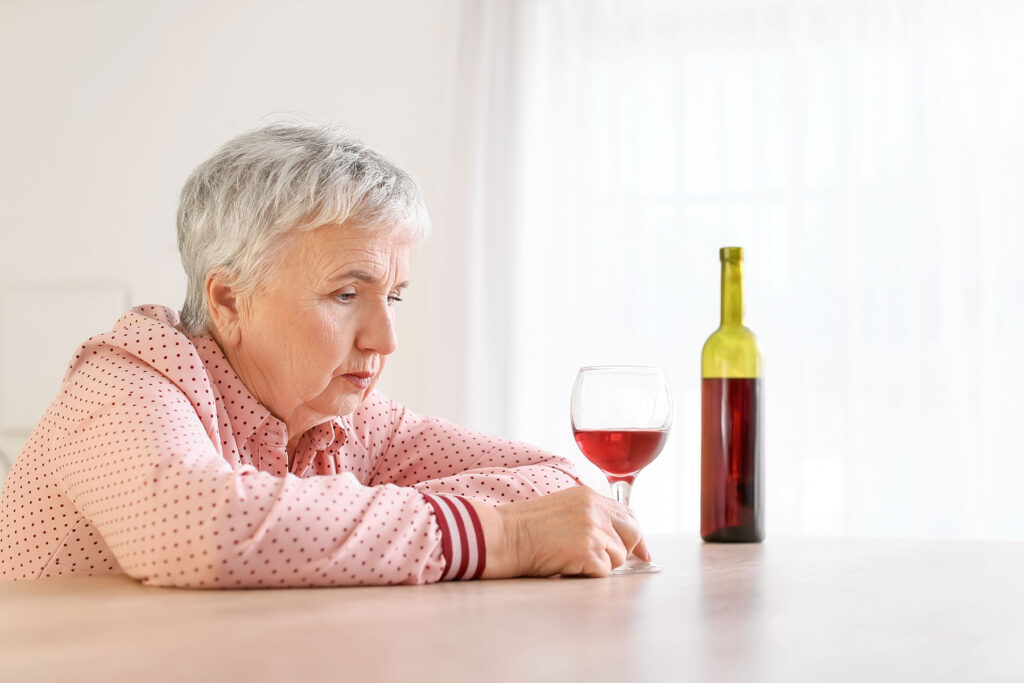Have you ever wondered about behaviors that might lead to alcoholism? The truth is that alcoholism can manifest at any stage of life, even later in adulthood. This phenomenon, called late-onset alcoholism, is a cause for concern as it can significantly impact the well-being of the individual and their loved ones.
Evoke Wellness at Miramar offers comprehensive alcohol addiction treatment options tailored to older adults’ unique needs. With a team of experienced professionals, we provide evidence-based therapies that address the root causes of addiction and help individuals develop healthy coping strategies. Contact us at 866.931.9312 to learn more.
Late-Onset Alcoholism
Late-onset alcoholism refers to the development of alcohol use disorder (AUD) in individuals who begin to exhibit problematic drinking patterns later in life, typically after the age of 63. Unlike early-onset alcoholism, which usually starts in adolescence or early adulthood, late-onset alcoholism is characterized by a sudden and unexpected escalation of alcohol consumption.
Though it is less common than early-onset alcoholism, late-onset alcoholism is still a significant public health issue. Individuals who develop alcohol dependence later in life face unique challenges, as they may have more difficulty adapting to the changes in their lives and coping with the repercussions of their addiction.
What Causes Late-Onset Alcoholism?
What causes late-onset alcoholism? Several factors may contribute to its development. Some of what causes late-onset alcoholism include:
- Retirement and loss of social connections – For many, retirement can be a significant life change that brings about feelings of loss and loneliness. The absence of regular social interactions and the sudden abundance of free time can lead to boredom and feelings of isolation, which may prompt some individuals to turn to alcohol as a means of coping.
- Stress and anxiety – Late adulthood is often accompanied by various stressors, such as financial strain, health issues, or losing a loved one. These stressors can trigger anxiety and depression, which some individuals may attempt to alleviate through alcohol consumption.
- Age-related physiological changes – As people age, their bodies undergo various physiological changes that can affect their tolerance for alcohol. A decrease in liver function and a reduction in the overall water content in the body can lead to an increased sensitivity to the effects of alcohol. This heightened sensitivity may result in an individual consuming more alcohol to achieve the desired effect, potentially leading to dependence.
- Genetic predisposition – Some individuals may have a genetic predisposition to developing alcoholism. Environmental factors or life changes can trigger late-onset alcoholism. Combined with these genetic factors, this may increase the risk of developing an alcohol use disorder.
- Self-medication – For some older adults, alcohol may be seen as a means of self-medication for physical or emotional pain. Chronic pain, sleep disturbances, and mood disorders are common in older adults; some may use alcohol to manage these symptoms.
Late-onset alcoholism can be a devastating and overwhelming experience for the individual and their loved ones. Recognizing the signs and seeking professional help as soon as possible is crucial.
Evoke Wellness at Miramar Can Help with Alcohol Addiction Treatment
At Evoke Wellness at Miramar, compassionate and experienced professionals are ready to help individuals overcome alcoholism and reclaim a meaningful life. Our alcohol addiction treatment program can provide the support and guidance necessary to develop healthy coping mechanisms and live a long-term sober life.
If you or someone you know is struggling with late-onset alcoholism, don’t wait for the situation to worsen. Take the first step towards healing by contacting Evoke Wellness at Miramar today. Embrace the opportunity to transform your life and experience the freedom of long-lasting recovery. Reach out at 866.931.9312 or online to learn more and take the first step toward lasting recovery.


